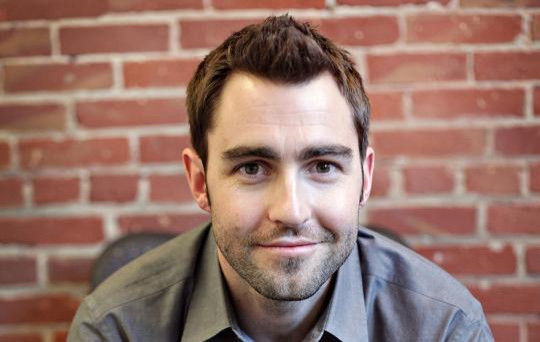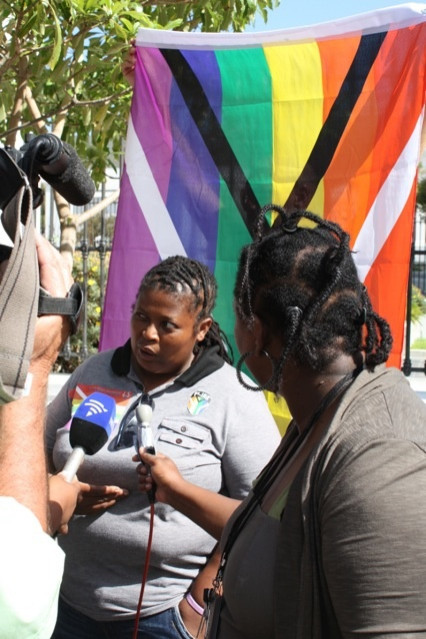Change.org Petitions Cover Issues From Sarah Palin To Human Trafficking To The Rape Of Lesbians In South Africa; A New Model For Global Change

When Ben Rattray founded Change.org from his San Francisco house in 2007, he had the modest but worthy vision of establishing a multipurpose online home for activists looking to create positive social change by raising money, volunteering or signing petitions. Unfortunately, the site wasn’t very successful, and by 2008, it had evolved into a platform for progressive bloggers, with a few other functions.
While that increased traffic a bit, the real seeds for the site’s eventual off-the-charts success weren’t planted until 2011, when Ndumie Funda, a woman from South Africa, visited an Internet café in Cape Town and utilized the site’s petition tool to end “corrective rape.” Lesbians were reportedly being raped in South Africa, especially in the “townships,” and sometimes even killed in order to “cure” them of their gayness, and Funda demanded that this despicable practice be stopped.
Most of Change.org’s petitions until that point had garnered a few hundred signatures at most, but Funda’s petition went viral, gathering more than 171,000 signatures from 175 countries and getting international media attention. Subsequently, the South African government formed a team to tackle the issue.
Seeing how this seemingly powerless woman could galvanize real change convinced Rattray to dump the site’s blogs and other functions and make it a petition-only site.

“We’d tried a lot of things -- a nonprofit jobs site, a blogging platform -- but we had yet to find a truly revolutionary way to use technology to create massive, scalable change,” Rattray told IBTimes. “It wasn’t until Ndumie’s petition took off that we had our ‘ah-ha’ moment. I pivoted at that moment to focus on building the world's first truly global empowerment company."
In the two short years since that reboot, Change.org has become a ubiquitous Web presence that almost rivals Facebook and Google. And Rattray, who’s also the CEO, has become a celebrity of sorts. The preppy, handsome Santa Barbara, Calif., native and Stanford graduate, who grew up thinking he would end up working on Wall Street, was included in the 2012 Time 100 list of the world's most influential people and listed as one of Fortune’s 40 Under 40 rising young business leaders of 2012.
Rattray recently announced that his site has surpassed 50 million users worldwide, meaning that number has signed on to petitions (since the announcement, the number has increased to more than 54 million), and making Change.org the largest petition site in the world, with participants in 196 countries and staff in 18 countries, and arguably the most effective online venue for social change on the planet.
Change.org has enjoyed some resounding success stories with its petitions:
- In India, a young woman who survived a brutal acid attack won her recent petition campaign to regulate the sale of acid in that country.
In Thailand, rural teacher Ajarn Chatchawan’s petition helped save thousands of village schools from closure after hitting the front pages of national newspapers and changing the Thailand education minister’s mind.
In Indonesia, President Yudyohono publicly supported a petition championing the investigation of police corruption and misconduct.
And in Brazil this year, after politicians tried to give themselves immunity from corruption charges, prosecutors started a swarm of Change.org petitions that resulted in street protests and a dramatic victory.
In the U.S., there’ve been many high-profile petition victories. Matt Zeller, an intelligence officer who served in Afghanistan and Iraq, won a visa for Janis Shinwari, the Afghan translator who saved his life. And 10-year-old Sarah Murnaghan won the right to receive a lifesaving lung transplant.
Human-trafficking victim Sarah Kruzan was released from a California prison after a petition with more than 250,000 signatures was sent to Calif. Gov. Jerry Brown. And Molly Katchpole, a 22-year-old nanny, collected 300,000 signatures and kept Bank of America from introducing monthly debit-card fees.
Matthew Slutsky, Change.org’s managing director of partnerships, told IBTimes that the global growth of the site has surprised everyone at the company.
“We had a sense based on the inherent viral nature of petitions and, by studying other platforms, that there was tremendous potential for scale, but we weren’t exactly sure how the platform would be received outside of the U.S,” he said. “We learned quickly that success is contagious, no matter where you live.”
Since the pivot to a petition platform, “millions of people living outside of the U.S have started, signed and won petitions,” Slutsky said. “As a result, we now have users from every country on the planet.”
The petitions' topics are wide ranging, including the environment, human rights, education, sports, health, criminal justice, technology, women, gay rights, animals, disabled rights, food and immigration.
These are just a few of the current campaigns:
Cancel the upcoming show "Amazing America with Sarah Palin"
Walmart: Rehire employee fired for price-matching turkey
Google: Change the YouTube comment section back to its original form
Wilson Sporting Goods: Make Your NCAA Basketballs in America, Not China
Politics and Controversy
The site, which according to Slutsky, recently launched a “promoted petitions” revenue stream, announced a $15 million mission-driven investment led by the Omidyar Network, and is committed to never selling or going public, has been attached to some of the biggest news stories of the last two years.
Last year, Trayvon Martin’s parents launched a petition calling for criminal charges to be brought against George Zimmerman. Of course, that petition went global, attracting more than 2 million signatures and prompting protests as well as international media coverage.
Change.org spokesperson Megan Lubin noted that the staff will remove content that violates its Terms of Service or Community Guidelines. “We will remove petitions with hate speech or those that incite violence,” she said.
In many ways, Change.org is the peaceable sibling of more potentially volatile social media sites, such as Facebook and Twitter, which are frequently used to organize protests and even violent conflicts. And while the website has liberal roots, it will not turn down a petition for political reasons if it does not violate the terms. During the presidential election last year, virtually every debate-related topic you could think of was being raised on the petition site.
Some were earnest, like the one in which more than 6,700 people asked the Commission on Presidential Debates to open the debates to Libertarian and Gray Party candidates. Other petitions were goofy, like the one asking that President Obama and Mitt Romney give each other a hug, and the one that wanted to see Judge Judy behind the moderator desk.
But the petition that got the most attention in the run-up to the election came from three New Jersey high-school girls who demanded that at least one of the debates have a female moderator. Eight weeks and more than 122,000 signatures later, they won their campaign. CNN's Candy Crowley moderated the second debate.
Of course, many petitions are not successful, like the one that urged two drug companies to save a dying melanoma cancer patient's life. Last month, Nick Auden died after bravely waging a public battle against Bristol-Myers Squibb and Merck, which both have a drug in late-stage clinical trials that Auden’s doctors said was his last chance to survive.
The petition campaign did not save Auden. However, the petition got more than half a million signatures and attracted support from cancer experts, politicians, the Federal Drug Administration, celebrities and the general public from across the globe.
Nick’s wife, Amy Auden, told IBTimes that while social media, the press, politicians, celebrities, the general public and the FDA all supported her campaign to try and get anti-PD-1 for Nick, “It was through our Change.org petition that we could truly gauge the huge number of people behind us -- to say to Merck and Bristol-Myers Squibb that over half a million people support us and what we are doing was truly powerful.”
She added, “We did not get the drug that Nick so urgently needed. As devastating as this is, we know we did absolutely everything within our power at this time to try to convince the drug companies to change their position. We hope that the momentum will continue so that one day drug companies with breakthrough drugs in late-stage trials are compelled by law to give the drugs to people who so desperately need them for a chance to live."
In an eerily similar petition, Andrea Sloan, 45, an ovarian cancer patient and attorney in Austin, Texas, who serves as executive director of the Texas Advocacy Project, is urging a drug company to give her the one drug that doctors say can save her life. The FDA has approved her use of the drug, pending approval by BioMarin Pharmaceutical. So far, that approval has not been granted.
Change.org’s Lubin said that even when their explicitly stated goal is not successful, petititions often still spark movements.
"Even after something is considered a failure, the cause is carried on," she said. "The petition for Nick Auden certainly is an example of this. Expanding the compassionate use of drugs is a tough one for petitioners, but they are so heart-wrenching, and we have seen extraordinary involvement. Nick’s campaign used the power of his compelling story to its full effect. And I hope and think future petitions on this same issue will be more successful because awareness has now been created.”
Secrets of Success
So what is the secret to Change.org’s success? After all, there are a number of successful petition sites, including Care2’s thepetitionsite.com, ipetitions.com and Causes.com. But none has reached Change.org’s level of success.
Lubin suggested that one of the things that sets Change.org apart is the fact that the staff is “hyperfocused” on impact. For its platform to actually empower people to change things, Lubin said, “we need to do three things: get people to start petitions, make those petitions compelling enough for people to sign, and get decision-makers to care.”
The staff has made the site easy to use and, said Lubin, is always looking for ways to make it easier. To make petitions compelling, the site encourages petition starters to keep things as personal as possible and to write their petition from their own perspective and explain why the issue matters to them.
To make decision-makers care, Lubin added, “we’ve built our tool so you can actually add the email address of the person you’re petitioning, and when someone signs your petition, they’ll be notified directly. That way, there’s no escaping the fact that tens or hundreds or thousands of people are asking you to do something.”
Meanwhile, back in South Africa, the country’s minister of justice recently announced that the government intends to introduce the concept of hate crimes law for the first time.
“It has taken nearly three years for Ndumie and her fellow activists to realize a full victory, but thanks to their dedication and passion, hate crimes legislation is being introduced for the first time,” Rattray said. “It is extraordinary to be reminded time and again the profound power people have to change the world.”
As for Change.org’s future, Slutsky said, “If we do our jobs right, before long, people won’t think about where to go when they want to create change. They’ll just come to Change.org. Our vision is a world in which creating change is a part of everyday life, and there's a palpable sense within the company that we are just beginning to recognize the potential of that vision.”
© Copyright IBTimes 2024. All rights reserved.
Join the Discussion





















